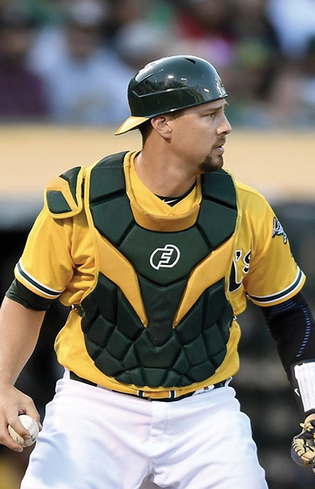
MLB Photography
There’s philosophy. And then there’s baseball. Which of those skills would you choose? Ryan Lavarnway ’09 is onto them both.
Peter Richmond ’76 is a New York Times bestselling author and lifetime sports scribe. The interview has been condensed and edited
View full image
Ryan Lavarnway ’09 had an excellent reason to leave New Haven after his junior year in 2008. The philosophy major had gotten a job offer he couldn’t refuse: the Boston Red Sox offered him $325,000 to sign a contract in June 2008 and report to work ASAP. He’d torn up the Ivies the two previous springs, posting the highest batting average in the NCAA (Division 1) in his sophomore year, and he led the Ivies in home runs and RBIs in 2008. Lavarnway’s subsequent rise through the minor-league ranks (Lowell, MA; Greenville, SC; Salem, VA; Portland, ME; Peoria, AZ, Pawtucket, RI) was steady and award-studded. And he had a dream-like debut in the majors in 2011, hitting two home runs in his first start as catcher with Boston.
But pro sports can be a fickle calling. In the ensuing decade, Lavarnway played for eight different Major League Baseball teams and their minor-league affiliates. When we talked in September, he had just been called up from the Triple-A Columbus Clippers by the Cleveland Indians. (In his first game with Cleveland, he hit a double.) Cynical scribes might describe Lavarnway as a “journeyman.” But if so, it’s been the kind of journey every kid who ever wore a glove would envy. And at 34, he’s still at it, and loving every step on the way.
Peter Richmond: How did you choose your major at Yale?
Ryan Lavarnway: I majored in philosophy because they told us to study what we were passionate about. Philosophy was my passion—the idea of trying to find an answer to questions, things that didn’t have simple answers.
PR: You’re one semester away from the degree. You’re determined to finish it?
RL: It was a promise I made to myself: finish what I’ve started.
PR: What was it about the Yale baseball experience that prepared you for the pros?
RL: The biggest thing for me was learning how to focus on what you’re doing right now, on where your feet are right now. When I was writing a paper, I couldn’t be worried about a 3–2 curveball. When I was in the field, I wasn’t worried about a paper that was due. In the heart of the moment in a big game, it’s a very good skill to have. You have to separate what you’re doing from the other aspects of your life.
PR: Greatest career memories?
RL: I’ve had a few pretty memorable highlights. The first two homers in game one in Boston. Winning with them in 2013. My performance with the Israeli team in the [2017] World Baseball Championships. [Ranked 41st, Israel beat third-ranked South Korea and fifth-ranked Taiwan in the qualifying round.] Being released by the Yankees and signing with Cincinnati a few hours later—
PR: —where, that next night, you had three hits—two of them home runs—and six RBIs: the first time any Red had done that since Johnny Bench in 1973.
RL: We moved the whole apartment into the back of the car and drove eight hours from Scranton to Cincinnati.
PR: So what is it about playing this game that you love? The closeness of a clubhouse? Being a member of a special tribe?
RL: I think there’s just something about playing a game where every day is a new challenge. You can’t rest on yesterday. It always has to be a challenge. If it were easy, it wouldn’t be fun. It’s all about the satisfaction of overcoming challenges.
PR: Such as?
RL: Some of my more serious roommates and their parents didn’t see sports as a legitimate career path.
PR: Your 33 home runs is a Yale record, even without playing a final season. How does one exactly hit a home run?
RL: First, hit the ball. I personally don’t try to hit them out. If it goes out, it’s a happy accident.
PR: The best major-league managers are often players who’ve spent considerable time in the minor leagues. Are you thinking of a future in managing?
RL: I still enjoy playing. I have a lot of playing time left in me. I’ll worry about what comes next when it becomes now.
 loading
loading